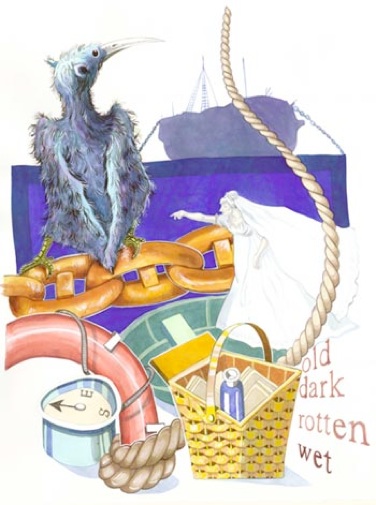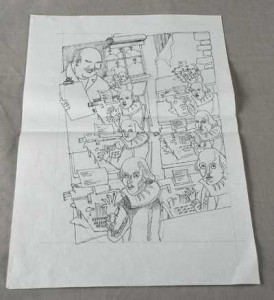Some inspired and dramatic choices for this week’s reading list, starting with the image suggested in the first paragraph of Rosenblatt’s (1978) The Reader, the Text, the Poem: a darkened stage, two chair and a book. Much of this discussion recalls one of the novels I had just finished rereading, from Jasper Fforde’s Thursday Next series. Whether it was Lost in a Good Book (2002) or The Well of Lost Plots (2003), I cannot recall, but the scene played out could have just as easily been restaged in Rosenblatt’s discussion. Miss Havisham, I believe, was telling her rookie Jurisfiction agent Thursday about the role the reader plays in the creation of a narrative. The author seems to get all the creative credit, her point echoing Rosenblatt, while the people who choose to read the book (and at what point in their lives the reading happens) become so generalized as barely to be mentioned in any discourse on literacy.
Throughout the chapters, Rosenblatt invokes poets, playwrights and other authors but they merely seem incidental. Perhaps what she really wants to draw attention to is the fact that she has read this poem, seen that play etc. On a similar note, Bakhtin slyly slips in a quotation from Gogol’s Dead Souls which made me smile… oh, those Russians! Back to Rosenblatt, the Robert Frost experiment she describes is a wonderful examination of what goes on inside the reader’s head, minus any background knowledge they bring to the text – what might have happened if one of the student recognized the stanza? New word of the day comes a chapter or two later, where she contrasts “efferent” (p. 24 et passim) with the aesthetic sense of reading. Here I may need to reflect upon the classroom discussion for her idea to sink in, so stay tuned to the comment section below. Of course, the chapter I am figuratively dying to read is not included in this excerpt, but someday soon I will catch up on her discussion of timelessness texts for Hamlet and The Waste Land.
Now for Bakhtin’s article, I must admit that I was efferently carried away from the meaning that he was making, by a very simple mistake. What seems like a lifetime ago, I was an actor in small productions around town, and I got really excited about a production of Stoppard’s Rosencrantz and Guildenstern Are Dead; I was advised by one of the director I was working with to read as much of Stoppard’s plays as I could, and set about collecting and enjoying those. A few weeks before I shipped myself off to Japan, for what was to become the next phase of my life as a teacher, I found in the library a new collection of plays called the Coast of Utopia. It was a trilogy that followed the ups and downs of Russian anarchist Mikhail Bakunin. Here’s where the mistake comes in, as any reader might start to sense in this lenghtening digression: when I saw on the class reading list an article by Bakhtin, my mind immediately leapt to the conclusion that we were going to reading about that guy from the Stoppard play I never got to finish reading. Wonder what Ferdinand de Saussure would think about me unconsciously substituting a “un” for the “ht” (not withstanding the Russian characters Бахт’н and Бакунин that signify their surnames as originally given to them)? Ah well, plenty more to write about the actual Mikhail Bakhtin in the comment section below 😛
 Ferdinand de Saussure by Jonathan Culler
Ferdinand de Saussure by Jonathan Culler
Finally, one author who can’t escape so easily is the one who barely wrote anything during his game-changing career as a philologist and professor of linguistics. Kind of silly to dwell on these biographical details, when so much of what is written about his theory of language is worth discussing here, as opposed to the comment section below. yet out of respect for this proto-linguist, i want to bring any thought I have about Culler’s text into the classroom to discuss. One of the greatest shifts from my Master of Educational Technology and the current Literacy Education PhD programs is the amount of face-to-face time instructors and students. If there is not a rousing discussion on the sounds and utterances de Saussure observed coming from round the tables, I don’t think there will be much more I can add to this online discussion that will set the record straight.


2 Comments
The one thing each of this week’s authors had in common was the importance of making meaning particular to one’s life experience. Class discussion was productive, and the inverted jigsaw activity a successful way to become experts in one area, yet the meaning that is made can still differ widely between individuals. A point was raised somewhere in class on whether reading could be reduced to a summary or writing to a précis, what meaning would one expect to create? A powerpoint can highlight important concepts, and even Victoria’s diagram can summarize the connections between the authors, but then what goes missing? Bakhtin writes about the dialogic nature of every utterance, and each idea is related to others whether or not the utterer intends there to be a connection. So a short summary is like reading the longer text, just like a few words can cover an entire conversation. It is still important to go back to the ideas as they were originally presented, especially as we try to grasp the theoretical frameworks structuralist/poststructuralist have set up for us. Where does this leave us with de Saussure, where we can only read a few articles he wrote, and must piece out the greater conversation from his students’ lecture notes? The meaning I make from a week’s worth of reading and a few hours of classroom discussion is bound to change as more ideas brush up and contrast with Rosenblatt, Bakhtin and de Saussure’s, and I look forward to seeing their dialogue with multiliteracies theorists like the New London Group.
Hello Kyle, provocative comments thought am not sure i follow all your lines of flight above. What i do find interesting is the problem of the summary/precis/gisting (if you will) of a theorist’s work which leaves out all of the rich intertextual and dialogic utterances in the creation of a work and its fuller explication. (This is why Bakhtin always figures in to my work somehow). In fact, this is the great drawback of a course that is a kind of survey of theory/of ideas — I will leave it to each of you to go back and immerse yourself in those few scholars whose ideas grab you the most and provide you with the support you desire to do your own work.